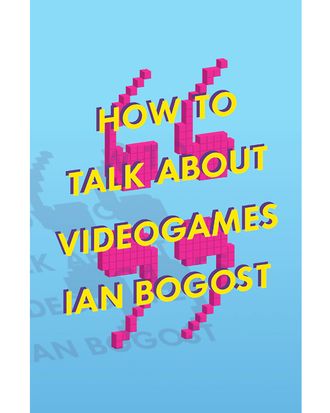
Video games are a pop-cultural paradox — ridiculously lucrative but strangely sequestered, simultaneously entertainment’s biggest niche and its final frontier. If video games are the future, they have, for some reason, remained a future non-gamers have safely ignored.
Why is that? In his new book, How to Talk About Videogames, critic, academic, and game designer Ian Bogost tackles both this question and the larger issue of why it’s worth casting a critical eye on games when the audience for that kind of thinking and writing is so marginal. (And why, unlike film or TV, there is not a robust corps of gaming critics.) A few days after the release of his book, the author also sat down with Vulture to talk about gaming’s curious place in the critical discourse and the problems of gamer culture.
How would you describe the current state of talking and writing about games?
For a long time, there’s been this assumption that games are just like everything else, like movies or like television or literature — anything else that we do serious criticism for. It was always just a matter of time, the clouds would part, and the light would shine down on the seriousness of games in the 20th century as a cultural form, and perhaps even the predominant 21st-century form. What’s happened instead is something I’ve been trying to understand. Games were always stuck between gadgets and art. The games press remains primarily what we call an enthusiast press. It’s … a different work than the work of cultural criticism. It’s asking, does this thing do the thing for me? You could say that that’s terrible, that it’s instrumentalizing cultural works, but I think, more interestingly, it’s fascinating to observe the fact that the gaming community actually seems pretty fine with that! They’re happy with that sort of conversation.
Your book seems to posit that games and games writing will never choose between the enthusiast’s conversation and the cultural one, but instead remain this weird hybrid.
Yeah, you look at other areas that we don’t think of frequently when we think of criticism: architecture or automobiles or wine or food. These are areas where there has been a tradition of toeing that line between the functional and the aesthetic, and realizing that you’re always dancing across it in an uncomfortable way. And it was always weird to talk about those things critically, and the only reason it worked was because of that dance, if it worked at all. You can see signs of that with video-game writing.
How can video-game criticism move from being a weird and uncomfortable subject to a respected discourse?
You’re going to end up banging your head against a wall if you think that, magically, time will pass, and because a generation that grew up with video games will become older and in positions of greater authority, that, suddenly, the cultural Zeitgeist will shift. There’s still not the audience that we expected, and it’s still not the sort of audience that we expected. I’ll write something, and someone will always ask, ‘Is this a parody? Are you joking?’ So one of the things I’ve been trying to own personally is struggling to live in that weird middle space, and maybe what we’re actually in need of is this strange kind of critical middle ground, in which stuff that we didn’t consider subject to a critical eye is now accepted as being so. And that’s why it cannot be video games alone, it can’t just be video games that occupy that space. If you can write critically and seriously about driver’s licenses or refrigerators, that’s the sort of space that has to be opened. And for games to come along on that ride, we need a breadth and diversity of work that’s in this strange, uncomfortable middle ground between functional and aesthetic discourse. You can take a break from just using something and step back and go, ‘Huh, there’s more going on here than I normally think about.’
Your book talks a bit about how we allow the discourse around games to be dictated by those outside of it, and how they’re reluctant to discuss anything of substance. Can you talk about that a little more?
The games industry has always been stuck between Hollywood and Silicon Valley. The world of video games is just not sure whether they want to be leftist activists or whether they want to be libertarians. There’s a hypocrisy of claiming to do both, creating meaningful work worthy of the protection of free speech, ignoring the fact that there are very few efforts working to push discourse on any subject in a direction that would be uncomfortable, pushing the envelope on what is standard or accepted in contemporary culture. That’s when you know you’re saying something that matters, when people start getting bothered by it. The hypocrisy of wanting to have it both ways is the problem. You don’t see furniture-makers talk about how they need free speech to protect the integrity of their appliances.
That sort of thinking makes it very hard to say, ‘Hey, here’s this complicated and nuanced thing!’
Yeah, no one wants to hear that. No one ever wants to hear that. There have been enough proclamations about how terrible and wonderful games are. Haven’t we had enough of both of those lines?




